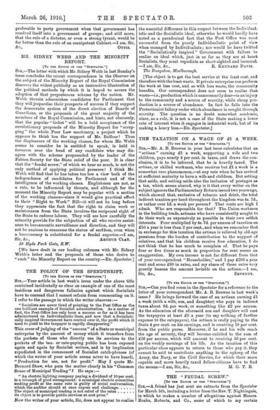THE POLICY OF THE SPENDTHRIFT. pro TEE EDITOR OF TER
" SPICTATOR."]
Sra,—Your article in last week's issue under the above title contained incidentally so clear an example of one of the most insidious and dangerous fallacies against which Socialists have to contend that I cannot refrain from commenting on it. I refer to the passage in which the writer observes :—
" Socialists are never tired of pointing to the Post Office as the one brilliant example of Socialist administration. As a matter of fact, the Post Office has only been a success so far as it has been administered on Individualistic lines, and now that a Socialisti- cally inspired Government have control over it, the profit which it used to yield to the taxpayer is rapidly disappearing."
This error of judging of the "success" of a State or municipal
enterprise by the amount of money which it transfers from the pockets of those who directly use its services to the pockets of the tax- or rate-paying publics has been exposed again and again by Socialist writers, and is by implication repudiated in the commonest of Socialist catch-phrases (of which the writer of your article seems never to have heard), "Production for nee, not for profit." May I quote Mr.
Bernard Shaw, who puts the matter clearly in his "Common Sense of Municipal Trading" P He says :—
" An electric lighting company paying a dividend of 10 per cent is a triumph of good management: a municipal electric committee making profit at the same rate is guilty of social malversation,
which the auditor should at once expose and challenge The object of municipal trading is not relief of the rates . . , . .
its object is to provide public services at cost price."
Now the writer of your article, Sir, does not appear to realise the essential difference in this respect between the Individual- istic and the Socialistic ideal, otherwise he would hardly have noted as a paradoxical fact that the Post Office was most successful from the purely Individualistic point of view when managed by Individualists ; nor would he have twitted the "Socialistically inspired" Government with failure to realise an ideal which, just in so far as they are at heart Socialists, they must repudiate as short-sighted and immoral.
—I am, Sir, &c., R. KENNARD DAVIB. The Bungalow, Marlborough.
[The object is to get the beat service at the least cost, and therefore with the least waste. If private enterprise can perform the work at less cost, and so with less waste, the community benefits. Our correspondent does not seem to realise that waste—i.e., production which is unnecessarily dear—is an injury to the community and a source of scarcity, while cheap pro- duction is a source of abundance. In fact he falls into the Protectionist fallacy under which abundance is sought through scarcity. The question is no doubt somewhat academic, since, as a rule, it is not a case of the State making a lower rate of interest when it engages in industrial work, but of its making a heavy loss.—En. Spectator.]






































 Previous page
Previous page